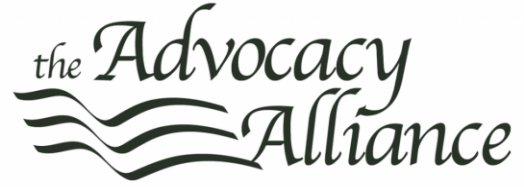Consumer Financial Management Services
Representative Payee
The Advocacy Alliance’s representative payee program is a system of financial and budgetary management for individuals who have a mental illness, individuals who have developmental disabilities, and older adults who are unable to manage their financial affairs or Social Security and other benefits.
The Advocacy Alliance provides representative payee services in Northeastern and South Central Pennsylvania, the Poconos and Lehigh Valley, as well as in Allegheny, Philadelphia, and Westmoreland Counties and New Jersey. The Advocacy Alliance has the capability to expand these services to other counties as requested.
Applying For Our Representative Payee Program
To apply for our representative payee services, you will need to complete an application form. Representative Payee Application. You may print and complete the Representative Payee Application by downloading the PDF form here. You will need the free Adobe Acrobat Reader program to open this document. If you do not have a PDF Reader program, please download Adobe Acrobat Reader to access and print the application form. After completing the application, please submit by email, mail or fax using the information below.
Our Mailing Address is:
Advocacy Alliance
Attn: Representative Payee Department
P.O. Box 1368
Scranton, PA 18501
Fax #: (570) 969-6922
Email Us
If you need any assistance with the application process, please call us at 1-877-315-6855.
Guardianship of Person/Estate and Power of Attorney
The Advocacy Alliance’s Guardianship/POA Department provides services to individuals who are in need of someone to make decisions on their behalf that ensures their safety and well-being. A Guardian of Person and Estate can only be appointed by the courts when the individual is legally found to be “incapacitated”. The Advocacy Alliance is appointed by the court to make personal, medical and end of life decisions as the Guardian of Person and/or to make financial (fiduciary) decisions as the Guardian of Estate on behalf of the “incapacitated individual”. The scope of these powers is defined by the court. The Advocacy Alliance also provides services to individuals who may need assistance with their current or future decisions medically and/or financially as Power of Attorney (POA) through a legal written document granting the Advocacy Alliance authority to act on an individual’s behalf. The scope of these powers is defined by the written document.
The Advocacy Alliance’s Guardianship Department provides Guardianship services to Northeastern, Central and South Central Pennsylvania, the Poconos, and Lehigh Valley. The Advocacy Alliance has the capability to expand these services to other counties as requested.
Trusts
The Advocacy Alliance Trust Department administers Special Needs Trusts which are created for individuals who have disabilities who are often in need of preserving their governmental benefits. A trust can provide for supplemental needs to add to the beneficiary’s quality of life and ensure the governmental benefits remain in force to provide basic support such as shelter, medical care and maintenance.
A special needs trust can be started by family members, the individual themselves, or by others. There are different alternatives for preserving the individual’s assets in special needs or supplemental trust and, depending on the amount and needs of the individual, the settler, or the funding source, the Advocacy Alliance will work to provide assistance in the creation of the right product for the individual with a disability.
Types of Trust Services the Advocacy Alliance Provides are as follows:
- “Pooled Trust” has one Master Trust Agreement for all members who join the “pool”. The trust can be joined by the individual, a parent, grandparent, or ordered by the court with small amounts of money but pooled to maximize earning potential through investments. Although the money is pooled, each individual in the trust has an account tracking their monies. This trust can only be established by a non-profit organization.
- Special Needs Individual “Payback Trusts” can be established by an individual, a parent, grandparent, guardian, or by a court. If the individual with a disability dies, the money left in the account is subject to pay back to Pennsylvania Department of Welfare for costs related to Medical Assistance.
- ”Common Law Special Needs Trusts” can be established with funds not belonging to the individual and thus are not subject to Medical Assistance payback. This trust can be created by a family member, a friend, or another entity but not the individual him/herself and the trustee must follow the guidelines of the trust agreement.
- “Education Funded Special Needs Trusts” are funded by a school district through litigation for educational needs and compensation. These trusts are defined by the trust agreement and if the monies are not spent, they may return to the school district.
All of these trusts are irrevocable and thus cannot be changed once established. They are established under state and federal guidelines.
The Role of the Advocacy Alliance as Trustee is to:
- Manage the funds and invest them prudently;
- Ensure that the individual who has a disability has access to these funds to improve their quality of life;
- Ensure the entitlements of the individual are not affected; and
- Ensure that all reporting and legal requirements are met.
Advantages of Trusts
- Established to enhance the individual with a disability’s life without disaffecting government benefits (e.g., SSI and Waiver).
- Established as part of estate planning to gift an individual with a disability without disaffecting government benefits.
- Funds in trust are preserved and not “spent down” on unnecessary items to maintain an individual’s eligibility for benefits.
